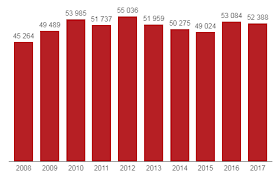Since the start of the election campaign, immigration has divided political parties. While the Coalition avenir Québec (CAQ) and the Parti Québécois (PQ) propose to lower the current thresholds, the Quebec Liberal Party (PLQ) promises, at a minimum, a stabilization, just like Québec solidaire. But what does immigration represent in Quebec and how does it work?
In 2017, more than 52,000 people came to settle in Quebec. This figure is relatively stable year after year, especially since 2008, when nearly 45,000 immigrants had left their country to settle in the province.
The following year, an increase of more than 9% was noted, before a peak to 55,000 newcomers in 2012. A level never reached since.
The number of immigrants arriving in Quebec Between 2008 and 2017
Source: Ministry of Immigration, Diversity and Inclusion
Contrary to what is sometimes conveyed, not all of these immigrants were chosen by the Quebec government. He is in charge of only a selection, majority, called "economic immigration".
Nearly 58% of immigrants, last year, came from this category and thus obtained a Quebec Selection Certificate (CSQ).
Being French is an asset
To obtain this document, which is essential to become a permanent resident of Canada, candidates must indicate their training, their age, their level of French or their experience. Each of these areas earn points according to criteria established by Quebec.
For example, being between 18 and 35 years old gives you the maximum number of points in this category.
Being French is an asset, but not essential to enter Quebec. In 2017, for example, 42% of all newcomers knew Molière's language. This figure rose to 61.5% for adult skilled workers.
Moreover, to obtain such a sesame is not instantaneous. Deadlines vary from several months to several years, depending in particular on the country of origin of the candidate and the number of applications received.
Subsequently, after obtaining this CSQ, the federal government is currently talking about a waiting period of 15 to 17 months to grant permanent resident status for this category of skilled workers. Ottawa checks, among other things, the applicant's criminal record and state of health.
The origin of newcomers in 2017
Asia: 43.4%
Africa: 27.5%
Europe: 15.8%
America: 13.1%
Oceania: 0.2%
Two other categories exist, but these depend solely on the federal government: family reunification (23.2% of immigrants to Quebec in 2017) and persons with refugee status (17.5% in 2017).
Importantly, it is not the government that directly grants refugee status. An independent administrative tribunal reviews asylum seeker files.
What are the party proposals?
For François Legault, the head of the CAQ, the number of newcomers to Quebec must be revised downward. He proposes to reduce this threshold by about 20% so that there will be only 40,000 new immigrants in Quebec, starting next year.
As it stands, he says, this model threatens the French language in the province. He is particularly worried that "our grandchildren no longer speak French" . A French test would be required after three years of presence in Quebec, he added.
The Parti Quebecois is also in favor of a decline. "Probably, it's going to be around 35,000-40,000 [people per year] because it's going to be success," said Jean-François Lisée.
Claiming that 26% of these immigrants left Quebec, the PQ leader nevertheless expressed his willingness to wait for a recommendation from the Auditor General to determine the exact number of people to be accommodated, according to the needs of the workforce. artwork.
Party proposals
CAQ: 40,000 immigrants
PQ: 35,000 to 40,000 immigrants
PLQ: 50,000 immigrants at least
QS: 50,000 immigrants
For his part, Philippe Couillard firmly maintained that he would not lower this threshold in the event of reelection . "Decreasing is uneconomic. It will create a Quebec even less prosperous than our neighbors, "he said.
A rise "is not excluded", he said, stating that a "democratic debate" would in this case be conducted in the National Assembly.
It is also out of the question to touch this figure, according to Québec solidaire.
The party of Manon Massé and Gabriel Nadeau-Dubois says it wants above all to act to "increase the presence of visible minorities and people of immigrant background in the public service", while improving the recognition of diplomas of immigrants.



Aucun commentaire:
Enregistrer un commentaire